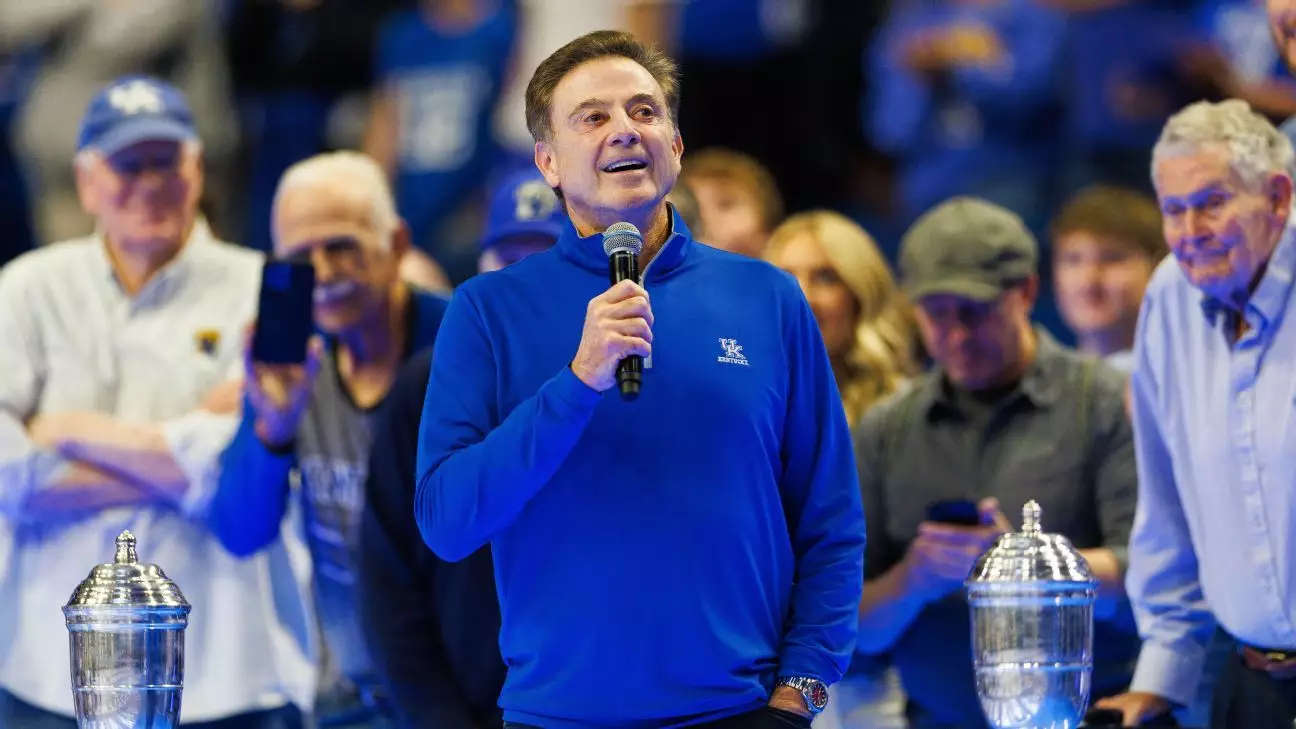Rick Pitino made a dramatic return to Rupp Arena on Friday night, over twenty-seven years after claiming the national championship title with the University of Kentucky in 1996. The atmosphere was electric, balanced with nostalgia and excitement as fans cheered for the man who had once donned the blue and white of Kentucky. As the current head coach of St. John’s University, Pitino stepped onto the court wearing a Kentucky sweater, symbolizing the complex tapestry of his coaching career. His arrival was particularly poignant, made possible by the appointment of Mark Pope, captain of the championship-winning team Pitino coached, as Kentucky’s new head coach earlier that year.
The event, known as Big Blue Madness, was a celebration not just of the past, but of the continued legacy of Kentucky basketball. As Pitino stood before the crowd, surrounded by former players and supporters, he found himself overwhelmed with emotion. “I am so happy to be back,” he expressed, encapsulating the significance of the moment. He reminisced about his time with the fans and players who had contributed to the joy he experienced during his eight years at Kentucky. It was a return to what he described affectionately as “Camelot,” speaking to the sense of pride that came with his tenure.
However, Pitino’s journey with the Kentucky fan base has not always been seamless. After ushering Kentucky to a national championship in 1996, Pitino landed a record-breaking contract with the Boston Celtics the following year. Unfortunately, his stint in the NBA was a turbulent one, leading to his resignation from the Celtics. In a controversial move, Pitino accepted the head coaching position at Louisville in 2001, making him the target of ire from Kentucky loyalists. From his very first press conference at Louisville, he acknowledged the challenge that awaited him, lamenting the backlash he would undoubtedly face from fans who once adored him.
The rivalry between Kentucky and Louisville reached new heights during Pitino’s tenure at the latter institution, particularly after John Calipari’s appointment as head coach at Kentucky in 2009. Under Calipari, the rivalry became intense, culminating in Pitino’s declaration of “pure hatred” ahead of a high-stakes Final Four matchup in 2012. The tensions between the two coaching legends brought notoriety to the rivalry, with incidents such as a notorious gesture from Pitino towards the Kentucky crowd further inflaming animosity.
Yet, in contrast to this tumultuous history, Pitino’s recent visit appears to symbolize healing. His mentorship of Mark Pope, who took the reins at Kentucky after Calipari faced challenges, may have helped to ease the long-standing tensions. Pitino’s support for Pope was evident in his endorsement, highlighting Pope’s commitment to embodying Kentucky basketball’s values. “You’ll never hear him say it’s about him,” Pitino declared, underscoring Pope’s humble nature and emphasizing the potential for Kentucky to reclaim its former glory.
The presence of Pitino at Big Blue Madness is not merely an acknowledgment of his past; it is an opportunity for reflection and hope for what the future holds for Kentucky basketball. The relationship between him and the Kentucky community appears to be on a path of reconciliation, driven by shared experiences and respect for the legacies within the sport.
As Pitino basked in the warm reception of a fan base that had once viewed him with skepticism, he not only honored the memories of his successes but also paved the way for an optimistic outlook. His parting words to the crowd emphasized his belief in Pope’s ability to elevate the program and bring back a winning ethos that Kentucky fans crave. “Mark Pope is going to lead you to greatness in every sense of the word,” he asserted, leaving the crowd with a sense of anticipation for the future of their basketball program.
Ultimately, Rick Pitino’s return to Rupp Arena serves as a reminder that in sports, as in life, forgiveness and personal connections often transcend rivalry and conflict. His journey of reclamation illustrates the potential for unity among fans, coaches, and players, rekindling the spirit of Kentucky basketball and inspiring the next generation of athletes.


Leave a Reply